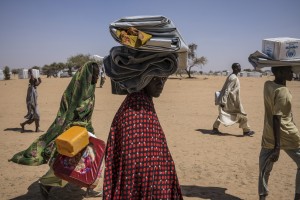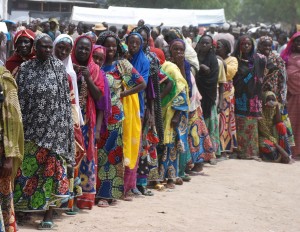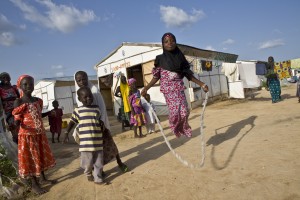Some Malian refugees in Burkina Faso decide to return home
UNHCR facilitates their transportation back to their country
OUAGADOUGOU, BURKINA FASO, 23 December 2014 (UNHCR) – In Burkina Faso’s refugee camps, Malian families who voluntarily decide to return to northern Mali now receive assistance for their departure from UNHCR. Since the beginning of the conflict in northern Mali in January 2012, hundreds of thousands of Malians fled their homelands and took refuge in neighboring countries. Burkina Faso currently hosts 33,140 of these refugees. The majority of them reside in two camps in the northern Sahel region as well as in a camp close to the capital Ouagadougou. Those who lost everything while fleeing their homeland benefit from support and protection from the Government of Burkina Faso, as well as from UNHCR and its partners.
For UNHCR, the volatile situation still prevailing in the northern part of Mali is not yet conducive to promote returns. “Given the current situation, we believe the security conditions do not yet allow for organized return operations,” explains Gogo Hukportie, UNHCR Representative in Burkina Faso.
The same view is shared by many refugees, who closely monitor the situation through the radio and maintain regular contact with family members in Mali. “Unfortunately, the insecurity that drove us away is still there,” says Idwoual, the head of a household of four children whom he brought to Mentao camp in the beginning of 2012. The camp, which is located 200 kilometres north of Ouagadougou, currently hosts 11,946 refugees.
Some Malian refugees nevertheless choose to leave Burkina Faso. “The reasons that can lead refugees to go back to Mali are numerous”, explains Olivier Beer, UNHCR Deputy Representative in Mali. “They may decide to return home to cultivate their fields in their village of origin, take care of their cattle or send their children to school”.
For those people who decide to return home, UNHCR and the Government of Burkina Faso have been facilitating their departure, informing them of the necessary precautions and providing them with financial assistance. “In response to the requests of certain refugees, UNHCR agreed to grant a modest amount to assist refugees in returning home with decent transport,” Gogo Hukportie clarifies.
 UNHCR / SOULEYMANE BAYOULOU
UNHCR / SOULEYMANE BAYOULOUWith financial help and advice from UNHCR a Malian refugee woman living in Burkina Faso’s Goudoubou refugee camp prepares to return to her home in northern Mali.
Overall, 865 Malians have benefitted from a return assistance of 35,000 CFA (USD 70) each since mid-November. This support is vital to those who would have sacrificed their savings and gone into debt in order to return to their homes. “Instead of selling my livestock to pay for the family’s transportation tickets, I would prefer to benefit from this UNHCR assistance,” said a grateful Souleymane who was leaving Sag-Nioniogo camp for Bamako with his family in mid-November.
Often, it is only after being reassured by former refugees from the same camp of the relative stability in some of their home villages in Mali that communities make the decision to return home and benefit from the assistance offered by UNHCR and its partners. Ahmed is one of these potential returnees who want to return northern Mali. “In my home village, the situation has settled down and my cattle are waiting for me,” he claims, eager to regain his herd and his homeland.
UNHCR has also been facilitating the return of Malian refugees from Niger. From November 2013 to May 2014, 5,610 persons received the return financial assistance at their point of departure. Return facilitation from Niger was suspended following violent incidents in Mali’s northern region of Kidal in early May, before resuming again last month. As of mid-December, 498 persons had returned to Mali and benefited from the return assistance.
In total, the Malian Government estimates that over 35,200 refugees have spontaneously returned home from Burkina Faso, Niger and Mauritania since June 2013, 14,356 of whom have been verified by UNHCR Offices in the region (including 6,615 facilitated by UNHCR). Most of them have returned to areas near Gao, Mopti and Timbuktu, in the northern part of the country.
In addition, UNHCR supports returnees through community-based projects, such as rehabilitating schools, providing medicine to hospitals with medicine, digging wells, distributing shelter kits, organizing self-reliance activities, and assisting vulnerable people with relief items. In order to foster peaceful coexistence in return areas, these projects benefit both host and returnee communities.
There are still over 143,000 Malian refugees in Algeria (1,330), Burkina Faso (32,082), Mauritania (55,414), and Niger (54,250).


















